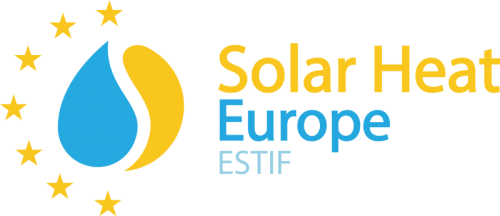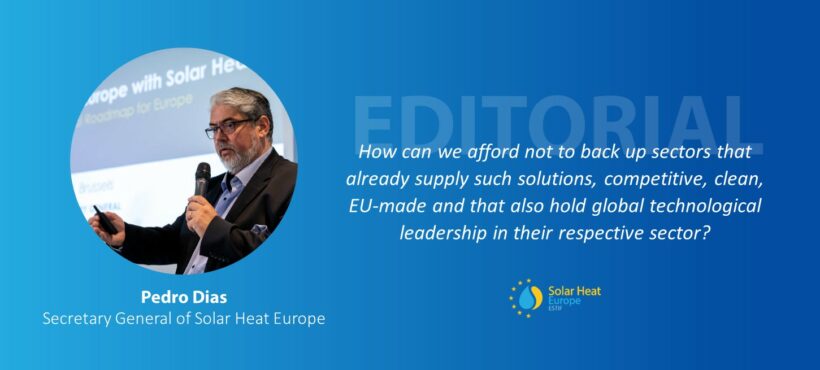We are witnessing a large number of relevant initiatives launched at European level regarding energy, mostly as a consequence of the current energy crisis. The most recent measure announced is the Green Deal industrial Plan (GDIP). This initiative, launched by the European Commission (EC) this February, is Europe’s reaction to incentive programs and protective measures launched by other economic blocks, in particular USA’s Inflation Reduction Act. One of the main goals of the GDIP is to ensure that adequate conditions are created for strategic net zero industrial sectors to further develop within European borders.
The proposed measures from the European Commission are relevant and deserve proper attention and additional discussion. The main concern Solar Heat Europe addresses is the need for an essential clarification about what defines strategic net-zero industries and the position of our industry in this context. The current references in the EC communication hint at these being extremely focused on technologies that promote electrification and that can, hopefully, also promote the decarbonisation of the power supply. As such, we can find references to the generation of renewable power or electrification, with solutions such as heat pumps or hydrogen.
In our view, a strategic sector such as direct renewable heat is overlooked. Why is this a concern of ours? The debate is not taking properly into account the complementarities between direct renewable heat supply and the electrification scenario. Using for instance a renewable heat solution such as solar thermal would enable energy sector integration between heat and power, ensuring as such diversity and increased reliability in the energy sector.
It is fully understandable that the European Commission and national authorities, having essential regulatory competencies related to power and gas, incorporate expertise in their services to address these important political portfolios. This primordial focus on the regulation of power and gas markets had as collateral damage their expertise and capacity to address the heating and cooling, as well as the renewable heating and cooling sector. This resulted in a clear lack of resources, expertise, data, and even awareness about renewable heating and cooling.
Furthermore, because power and gas are heavily regulated sectors, it also means that the main players, such as utilities or oil companies, have always invested considerably in their lobbying efforts, both at the European and national levels. One example of this is that we can easily find among the Board of Administrators of important European utilities, previous members of governments, and other influential politicians. The renewable heat sector, being mainly composed of SMEs, does not have a comparable capacity to make itself known to the main decision-makers. Consequently, the potential of this sector is largely overlooked.
Let’s take the example of solar thermal. It has manufacturers all over Europe, literally from Finland to Cyprus, it is competitive with incumbent solutions whenever lifecycle costs are considered, it is already installed in over 10 million households all over Europe, it provides the largest incorporated storage capacity of all renewables, and it is not dependent on the supply of critical raw materials or critical supply chains dominated by China or other world powers.
When we talk about increasing the energy generation capacity in Europe, about ensuring the security of energy supply, how can we afford not to back up sectors that already supply such solutions, competitive, clean, EU-made and that also hold global technological leadership in their respective sector? Obviously we can’t!
Often, when energy topics are discussed, in particular electrification, our arguments are dismissed because of concerns that our proposals are opposing electrification. It should be clear that we are not opposing electrification. We are highlighting some of the challenges that electrification faces, including the risk that current approaches to electrification lock in non-renewable sources and jeopardise the fast decarbonisation goal. We are saying that, on top of important challenges related to electrification (currently disregarded), it is possible to decarbonize faster if we combine electrification with existing solutions for direct renewable heat generation and storage. And we try to alert that the renewable heat sector, being mainly composed of SMEs, will never have the capacity to be as loud and close to the ears of our politicians as the power and the gas sector can. Nevertheless, it is in the interest of responsible public management to understand better these technologies and what they have to offer to the European energy system, to the European economy, to European citizens, and even to our geostrategic independence.
The answer to the energy crisis needed urgent measures. Still, we cannot remain hostages of the short term.
When looking ahead, considering both the short- and long-term needs, we must understand that there is untapped potential with renewable heat technologies, that can unlock additional manufacturing and installation capacity in Europe. To achieve ambitious targets, we need to add the potential of renewable heat to the equation and strike a balance between the promotion of different technologies to ensure that we are promoting a level playing field between renewable technologies in Europe. It is just unacceptable that, while trying to develop the conditions to manufacture solar photovoltaics in Europe, EU and Member States put in place measures that endanger the production capacity and the jobs that already exist in Europe in other sectors.
It is clear that the Green Deal Industrial Plan will not achieve its objectives if it doesn’t also include direct renewable heat, including solar heating and cooling! It is still time to steer this process in the right direction. And we count on the stakeholders in our sector to help us make this clear at the European and national levels.


Leave a Reply